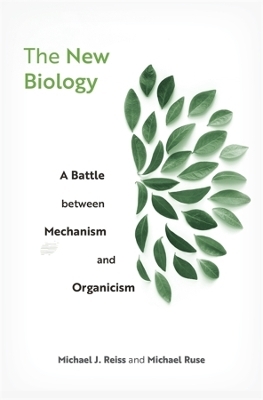
The New Biology
A Battle between Mechanism and Organicism
Seiten
2023
Harvard University Press (Verlag)
978-0-674-97224-7 (ISBN)
Harvard University Press (Verlag)
978-0-674-97224-7 (ISBN)
The New Biology argues that mechanical reductionism, though helpful in answering many biological questions, cannot on its own explain complex biological systems. Promoting a more holistic approach, the authors contend that both mechanistic and organicist views are invaluable frameworks for understanding life.
In this accessible analysis, a philosopher and a science educator look at biological theory and society through a synthesis of mechanistic and organicist points of view to best understand the complexity of life and biological systems.
The search for a unified framework for biology is as old as Plato's musings on natural order, which suggested that the universe itself is alive. But in the twentieth century, under the influence of genetics and microbiology, such organicist positions were largely set aside in favor of mechanical reductionism, by which life looks like a more complicated version of physics, one that can be reduced to the behavior of organic molecules. But can organisms truly be understood in mechanical terms, or do we need to view life from the perspective of whole organisms to make sense of biological complexity?
The New Biology argues for the validity of holistic treatments of nature from the perspectives of philosophy, history, and biology and outlines the largely unrecognized undercurrent of organicism that has persisted. Mechanistic biology has been invaluable in understanding a range of biological issues, but Michael Reiss and Michael Ruse contend that reductionism alone cannot answer all our questions about life. Whether we are considering human health, ecology, or the relationship between sex and gender, we need to draw from both organicist and mechanistic frameworks.
It's not always a matter of combining organicist and mechanistic perspectives, Reiss and Ruse argue. There is scope for a range of ways of understanding the complexity of life and biological systems. Organicist and mechanistic approaches are not simply hypotheses to be confirmed or refuted, but rather operate as metaphors for describing a universe of sublime intricacy.
In this accessible analysis, a philosopher and a science educator look at biological theory and society through a synthesis of mechanistic and organicist points of view to best understand the complexity of life and biological systems.
The search for a unified framework for biology is as old as Plato's musings on natural order, which suggested that the universe itself is alive. But in the twentieth century, under the influence of genetics and microbiology, such organicist positions were largely set aside in favor of mechanical reductionism, by which life looks like a more complicated version of physics, one that can be reduced to the behavior of organic molecules. But can organisms truly be understood in mechanical terms, or do we need to view life from the perspective of whole organisms to make sense of biological complexity?
The New Biology argues for the validity of holistic treatments of nature from the perspectives of philosophy, history, and biology and outlines the largely unrecognized undercurrent of organicism that has persisted. Mechanistic biology has been invaluable in understanding a range of biological issues, but Michael Reiss and Michael Ruse contend that reductionism alone cannot answer all our questions about life. Whether we are considering human health, ecology, or the relationship between sex and gender, we need to draw from both organicist and mechanistic frameworks.
It's not always a matter of combining organicist and mechanistic perspectives, Reiss and Ruse argue. There is scope for a range of ways of understanding the complexity of life and biological systems. Organicist and mechanistic approaches are not simply hypotheses to be confirmed or refuted, but rather operate as metaphors for describing a universe of sublime intricacy.
Michael J. Reiss is Professor of Science Education at University College London, a member of the Nuffield Council on Bioethics, President of the International Society for Science and Religion, and former Director of Education at the Royal Society. Michael Ruse is the former Lucyle T. Werkmeister Professor of Philosophy at Florida State University and Professor Emeritus of Philosophy at the University of Guelph. He is a Guggenheim Fellow, a Fellow of the Royal Society of Canada, a Gifford Lecturer, and the author or editor of more than sixty books.
| Erscheinungsdatum | 05.06.2023 |
|---|---|
| Zusatzinfo | 4 photos, 8 illus. |
| Verlagsort | Cambridge, Mass |
| Sprache | englisch |
| Maße | 156 x 235 mm |
| Themenwelt | Naturwissenschaften ► Biologie ► Genetik / Molekularbiologie |
| ISBN-10 | 0-674-97224-4 / 0674972244 |
| ISBN-13 | 978-0-674-97224-7 / 9780674972247 |
| Zustand | Neuware |
| Informationen gemäß Produktsicherheitsverordnung (GPSR) | |
| Haben Sie eine Frage zum Produkt? |
Mehr entdecken
aus dem Bereich
aus dem Bereich
50 Meilensteine der Genetik
Buch | Hardcover (2022)
Librero b.v. (Verlag)
CHF 13,90


